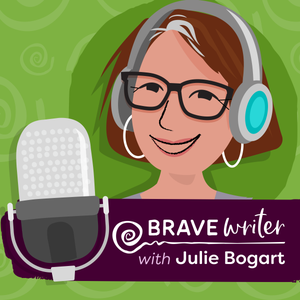
Brave Writer
Julie Bogart | Brave Writer
- 41 minutes 12 seconds271. Playing Big with Tara Mohr (Part 1)
What is it that holds women back when it comes to taking risks or living authentically? How can we raise our daughters so they don’t have to struggle as much as we have?
Tara Mohr, an expert on women's leadership and a homeschooling mom herself, joins the show today to discuss this topic and share her book, Playing Big: Practical Wisdom for Women Who Want to Speak Up, Create, and Lead.
We discuss developing self-trust and the difference between preparation and improvisation.
Be sure to stay tuned for Part 2!
Resources:
- Start a free trial of CTCmath.com to try the math program that’s sure to grab and keep your child’s attention
- Find Playing Big by Tara Mohr in the Brave Writer Book Shop
- Check out the Brave Writer Practice Pages
- Learn more about the Brave Writer Literature & Mechanics programs
- Read all Brave Writer class descriptions
- Sign up for our Text Message Pod Ring to get podcast updates and more!
- Send us podcast topic ideas by texting us: +1 (833) 947-3684
Connect with Julie:
- Instagram: @juliebravewriter
- Threads: @juliebravewriter
- Twitter: @bravewriter
- Facebook: facebook.com/bravewriter
Connect with Melissa:
- Website: melissawiley.com
- Substack: melissawiley.substack.com
- Instagram: @melissawileybooks
- Twitter: @melissawiley
Produced by NOVA
22 January 2025, 10:30 am - 46 minutes 33 seconds270. Celebrating Karen O’Connor
On New Year's Day, Julie's beloved mother, Karen O'Connor, passed away at the age of 86. Karen was a remarkable woman who touched the lives of many with her kindness, warmth, and wisdom. As a prolific author of 70 books and a gifted writing teacher, Karen's legacy is one of inspiration and creativity. She was deeply cherished by her three children, nine grandchildren, and four great-grandchildren.
In this special episode, we honor Karen's life and contributions by sharing an interview recorded in 2018, when Karen was one of Brave Writer's most beloved writing coaches. Through this conversation, we celebrate her incredible journey, her passion for writing, and her lasting impact on the Brave Writer community.
You can read Karen O’Connor’s obituary here. Donations can be made to the Sierra Club in her name. Visit Karen’s website and learn more about her books at www.karenoconnor.com.
Resources:
- Start a free trial of CTCmath.com to try the math program that’s sure to grab and keep your child’s attention
- Sign up for our new Substack: Brave Learning with Julie Bogart
- Take a look at the Brave Writer Book Shop
- Learn more about the Brave Writer Literature & Mechanics programs
- Read all Brave Writer class descriptions
- Sign up for our Text Message Pod Ring to get podcast updates and more!
- Send us podcast topic ideas by texting us: +1 (833) 947-3684
Connect with Julie:
- Instagram: @juliebravewriter
- Threads: @juliebravewriter
- Twitter: @bravewriter
- Facebook: facebook.com/bravewriter
Connect with Melissa:
- Website: melissawiley.com
- Substack: melissawiley.substack.com
- Instagram: @melissawileybooks
- Twitter: @melissawiley
Produced by NOVA
15 January 2025, 10:30 am - 1 hour 7 minutes269. 25th Anniversary Celebration, Part 2!
Welcome back for the second half of our walk down Brave Writer memory lane!
Julie regales us with never-told-before stories about the ups and downs of the Brave Writer business. She tells us about the one and only time she took out a loan for Brave Writer. We also hear about a stressful lawsuit that ended up with a scammer getting arrested!
Most of all, we hear story after story about how the love of writing, and the commitment to developing kids’ self-expression, has rippled out across thousands of lives.
Resources:
- Start a free trial of CTCmath.com to try the math program that’s sure to grab and keep your child’s attention
- Sign up for our new Substack: Brave Learning with Julie Bogart
- Take a look at the Brave Writer Book Shop
- Learn more about the Brave Writer Literature & Mechanics programs
- Read all Brave Writer class descriptions
- Sign up for our Text Message Pod Ring to get podcast updates and more!
- Send us podcast topic ideas by texting us: +1 (833) 947-3684
Connect with Julie:
- Instagram: @juliebravewriter
- Threads: @juliebravewriter
- Twitter: @bravewriter
- Facebook: facebook.com/bravewriter
Connect with Melissa:
- Website: melissawiley.com
- Substack: melissawiley.substack.com
- Instagram: @melissawileybooks
- Twitter: @melissawiley
Produced by NOVA
8 January 2025, 10:30 am - 57 minutes 47 seconds268. Brave Writer's 25th Anniversary (Part 1)
It started with editing church materials and swapping advice on 1990s internet message boards. Today, Brave Writer has served thousands of families, helping them transform their relationship to writing and each other.
In this episode, we walk you through the history of Brave Writer.
Take a listen as Julie explains why she started the business and how she grew it. Her story is unique, but similar to many homeschool moms’– discovering knowledge and skills that you didn’t even know you had.
The conversation is full of so many good stories, we decided to do a Part 2 next week!
Resources:
- Start a free trial of CTCmath.com to try the math program that’s sure to grab and keep your child’s attention
- Sign up for our new Substack: Brave Learning with Julie Bogart
- Check out the Brave Writer Practice Pages
- Find Julie's books in the Brave Writer Book Shop
- Learn more about the Brave Writer Literature & Mechanics programs
- Read all Brave Writer class descriptions
- Sign up for our Text Message Pod Ring to get podcast updates and more!
- Send us podcast topic ideas by texting us: +1 (833) 947-3684
Connect with Julie:
- Instagram: @juliebravewriter
- Threads: @juliebravewriter
- Twitter: @bravewriter
- Facebook: facebook.com/bravewriter
Connect with Melissa:
- Website: melissawiley.com
- Substack: melissawiley.substack.com
- Instagram: @melissawileybooks
- Twitter: @melissawiley
Produced by NOVA
1 January 2025, 10:30 am - 1 hour 8 minutes267. Natural Learning and the Brain
Learning is a natural function of the brain. As teachers, our job is to facilitate that natural function. In today’s episode, we dive into the research around how brains perform learning and the ideal conditions for optimal learning.
We dig into Renata and Geoffrey Caine’s research on the topic, focusing on three key areas: orchestrated immersion, relaxed alertness, and active processing. We explain how each one works and how to leverage them as homeschooling parents.
This episode is packed with information and ‘lipstick drops’ (you’ll understand after you listen). It will give you tools to create more ‘aha moments’ for you and your learners.
Resources:
- Start a free trial of CTCmath.com to try the math program that’s sure to grab and keep your child’s attention
- Find the book ‘Making Connections’ in the Brave Writer Book Shop
- Check out the Brave Writer Practice Pages
- Learn more about the Brave Writer Literature & Mechanics programs
- Read all Brave Writer class descriptions
- Sign up for our Text Message Pod Ring to get podcast updates and more!
- Send us podcast topic ideas by texting us: +1 (833) 947-3684
Connect with Julie:
- Instagram: @juliebravewriter
- Threads: @juliebravewriter
- Twitter: @bravewriter
- Facebook: facebook.com/bravewriter
Connect with Melissa:
- Website: melissawiley.com
- Substack: melissawiley.substack.com
- Instagram: @melissawileybooks
- Twitter: @melissawiley
Produced by NOVA
18 December 2024, 10:30 am - 41 minutes 1 second266. Julie's Back!
Julie’s back!
You may have noticed that Melissa’s been hosting the podcast solo recently. Today we learn why Julie has been absent and what she’s learned while she’s been away.
We talk about Julie’s experience with her mother’s illness, leading Julie to reflect on how her mother created a homeschooling culture for her kids even though they were enrolled in traditional school.
We also review how the Brave Writer’s Day Off Conference went and discuss our favorite parts.
Join us as we celebrate Julie’s return!
Resources:
- Start a free trial of CTCmath.com to try the math program that’s sure to grab and keep your child’s attention
- Check out the Brave Writer Practice Pages
- Learn more about the Brave Writer Literature & Mechanics programs
- Read all Brave Writer class descriptions
- Explore the Brave Writer Book Shop
- Sign up for our Text Message Pod Ring to get podcast updates and more!
- Send us podcast topic ideas by texting us: +1 (833) 947-3684
Connect with Julie:
- Instagram: @juliebravewriter
- Threads: @juliebravewriter
- Twitter: @bravewriter
- Facebook: facebook.com/bravewriter
Connect with Melissa:
- Website: melissawiley.com
- Substack: melissawiley.substack.com
- Instagram: @melissawileybooks
- Twitter: @melissawiley
Produced by NOVA
11 December 2024, 10:30 am - 49 minutes 16 seconds265. Celebrating Book Series with Dawn Smith
Is there anything better than the warm, magical feeling you get from a good book series? In today’s episode, Dawn Smith, Brave Writer’s Director of Publishing, joins us to discuss the power of children’s book series.
We talk about the unique delight of reading a book series, getting immersed in the characters and the world they live in. We also dig into how series help build kids’ confidence through repeat exposure to an author’s writing patterns.
Tune in to hear some of our favorite book series and the memories they helped us make with our kids.
Resources:
- Start a free trial of CTCmath.com to try the math program that’s sure to grab and keep your child’s attention
- Check out the Brave Writer Practice Pages
- Learn more about the Brave Writer Literature & Mechanics programs
- Read all Brave Writer class descriptions
- Visit the Brave Writer Book Shop to learn more about the book series we mention in this episode
- Sign up for our Text Message Pod Ring to get podcast updates and more!
- Send us podcast topic ideas by texting us: +1 (833) 947-3684
Connect with Julie:
- Instagram: @juliebravewriter
- Threads: @juliebravewriter
- Twitter: @bravewriter
- Facebook: facebook.com/bravewriter
Connect with Melissa:
- Website: melissawiley.com
- Substack: melissawiley.substack.com
- Instagram: @melissawileybooks
- Twitter: @melissawiley
Produced by NOVA
4 December 2024, 10:30 am - 43 minutes 59 seconds264. Rabbit Trails and Rabbit Holes
How can you go beyond the daily grind of lessons to truly enliven your kids’ learning? In this episode, we go over two methods that you might have already observed pop up naturally in your kids’ lives: rabbit trials and rabbit holes.
Is your kid super obsessed with something at the moment? That’s great! Feed their “rabbit hole” deep-dive with as much material and curiosity as you can.
Does your kid jump from one related topic to another? That’s great too! They are making connections between how things work via “rabbit trails.”
Your child’s natural curiosity is something to be fed, not fought. Join them in the hole or trail!
Resources:
- Start a free trial of CTCmath.com to try the math program that’s sure to grab and keep your child’s attention
- Check out the Brave Writer Practice Pages
- Learn more about the Brave Writer Literature & Mechanics programs
- Read all Brave Writer class descriptions
- Explore the Brave Writer Book Shop
- Listen to Episode 263: Appreciating Art with Bianca Bosker
- Sign up for our Text Message Pod Ring to get podcast updates and more!
- Send us podcast topic ideas by texting us: +1 (833) 947-3684
Connect with Julie:
- Instagram: @juliebravewriter
- Threads: @juliebravewriter
- Twitter: @bravewriter
- Facebook: facebook.com/bravewriter
Connect with Melissa:
- Website: melissawiley.com
- Substack: melissawiley.substack.com
- Instagram: @melissawileybooks
- Twitter: @melissawiley
Produced by NOVA
27 November 2024, 10:30 am - 1 hour 5 minutes263. Appreciating Art with Bianca Bosker
If you feel like an outsider when it comes to art, you aren’t alone. In fact, as Bianca Bosker explains, there’s a whole gatekeeping system built up around art: who you know, how you dress, what words you use, etc.
Lucky for us, Bianca Bosker spent five years finding a way past the gatekeeping. In her book and in today’s episode, Bianca brings back her findings to the rest of us, teaching us how to better seek out and appreciate art.
If you want to find more beauty and meaning in the visual world around you, this episode will help. Bianca’s frank insightfulness is life-giving.
Resources:
- Start a free trial of CTCmath.com to try the math program that’s sure to grab and keep your child’s attention
- Find Bianca’s book, “Get the Picture,” in the Brave Writer Book Shop
- Check out the Brave Writer Practice Pages
- Learn more about the Brave Writer Literature & Mechanics programs
- Read all Brave Writer class descriptions
- Check out the Class Schedule for Fall
- Sign up for Brave Writer 101
- Read Bianca’s other book “Cork Dork”
- Read “Sister Wendy’s Story of Paintings”
- Read “Drawing on the Right Side of the Brain”
- Sign up for our Text Message Pod Ring to get podcast updates and more!
- Send us podcast topic ideas by texting us: +1 (833) 947-3684
Connect with Julie:
- Instagram: @juliebravewriter
- Threads: @juliebravewriter
- Twitter: @bravewriter
- Facebook: facebook.com/bravewriter
Connect with Melissa:
- Website: melissawiley.com
- Substack: melissawiley.substack.com
- Instagram: @melissawileybooks
- Twitter: @melissawiley
Produced by NOVA Media
20 November 2024, 10:30 am - 1 hour 10 minutes262. Teaching Through Play
Play isn’t a reward for learning, it is the learning. In this episode, we dig into the puritanical reflex to be suspicious of anything fun, and rebuke it with developmental science and lived experience. We give ideas on how to create playful conditions for deep, sustainable learning for your kids and even yourself.
We also break down how to evaluate homeschool learning you’re already doing: How does it look like play? How are you capitalizing on tools, clothing, kinesthetic energy, excitement, and engagement? Does the skill being honed lead to something the kids actually want to do?
If you’re feeling stuck and bored with your homeschooling, or if your kids are feeling that way, this is the episode for you.
Resources:
- Start a free trial of CTCmath.com to try the math program that’s sure to grab and keep your child’s attention
- Check out the Brave Writer Practice Pages
- Peruse the Brave Writer Book Shop
- Learn more about the Brave Writer Literature & Mechanics programs
- Read all the Brave Writer class descriptions
- Check out the Class Schedule for Fall
- Sign up for Brave Writer 101
- Explore Tools for the Art of Writing
- Read Joyful: The Surprising Power of Ordinary Things to Create Extraordinary Happiness
- Read How Children Learn
- Read Free to Learn: Why Unleashing the Instinct to Play Will Make Our Children Happier, More Self-Reliant, and Better Students for Life
- Sign up for our Text Message Pod Ring to get podcast updates and more!
- Send us podcast topic ideas by texting us: +1 (833) 947-3684
Connect with Julie:
- Instagram: @juliebravewriter
- Threads: @juliebravewriter
- Twitter: @bravewriter
- Facebook: facebook.com/bravewriter
Connect with Melissa:
- Website: melissawiley.com
- Substack: melissawiley.substack.com
- Instagram: @melissawileybooks
- Twitter: @melissawiley
Produced by NOVA Media
13 November 2024, 10:30 am - 42 minutes 17 seconds261. How to Care for a Caregiving Friend
Chances are someone you know will have a sick child hospitalized at some point. In this episode, Melissa explains how you can best support that parent and caregiver. Melissa herself has had two of her kiddos hospitalized so her suggestions come from lived experiences.
First, Melissa discusses the practical physical items you can bring to a caregiver in the hospital: toiletries, quality food, and a kettle or wand for warm drinks. She also describes some digital gifts that you can send. Then she describes what little acts of service you can do: doing the laundry, lending an ear, and taking care of the siblings of the hospitalized child.
Sometimes caregivers are so overwhelmed or shy that they don’t know what to ask for. If your friend is having trouble expressing what they need, start with the items in this episode and then go from there.
Resources:
- Start a free trial of CTCmath.com to try the math program that’s sure to grab and keep your child’s attention.
- Melissa’s Medical Summary Template
- The embroidery kits mentioned in the episode can be found at cozybluehandmade.com
- Check out libro.fm to buy audiobooks from independent sellers (rather than Amazon/Audible)
- Here are the nice pens Melissa mentioned in the episode: Jetpens.com
- Check out the Brave Writer Practice Pages
- Virtually wonder through the Brave Writer Book Shop
- Learn more about the Brave Writer Literature & Mechanics programs
- Read all Brave Writer class descriptions
- Check out the Brave Writer Fall Class Schedule
- Join Brave Writer 101
- Sign up for our Text Message Pod Ring to get podcast updates and more!
- Send us podcast topic ideas by texting us: +1 (833) 947-3684
Connect with Julie:
- Instagram: @juliebravewriter
- Threads: @juliebravewriter
- Twitter: @bravewriter
- Facebook: facebook.com/bravewriter
Connect with Melissa:
- Website: melissawiley.com
- Substack: melissawiley.substack.com
- Instagram: @melissawileybooks
- Twitter: @melissawiley
Produced by NOVA Media
30 October 2024, 10:30 am - More Episodes? Get the App
Your feedback is valuable to us. Should you encounter any bugs, glitches, lack of functionality or other problems, please email us on [email protected] or join Moon.FM Telegram Group where you can talk directly to the dev team who are happy to answer any queries.
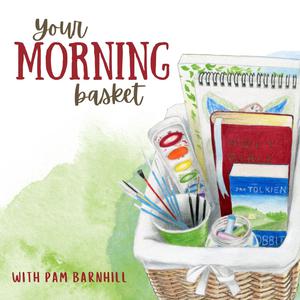 Your Morning Basket
Your Morning Basket
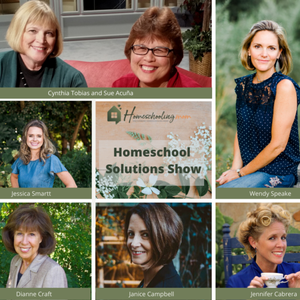 The Homeschool Solutions Show
The Homeschool Solutions Show
 WILD + FREE
WILD + FREE
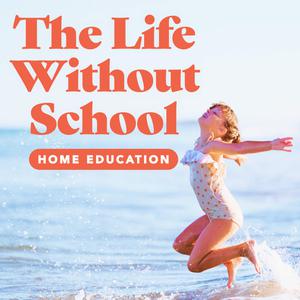 The Life Without School Podcast
The Life Without School Podcast
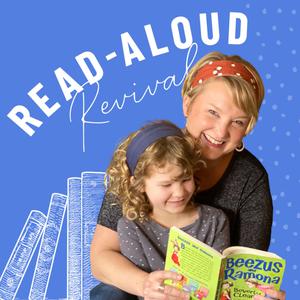 Read-Aloud Revival ®
Read-Aloud Revival ®
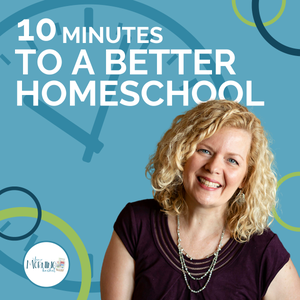 10 Minutes to a Better Homeschool
10 Minutes to a Better Homeschool